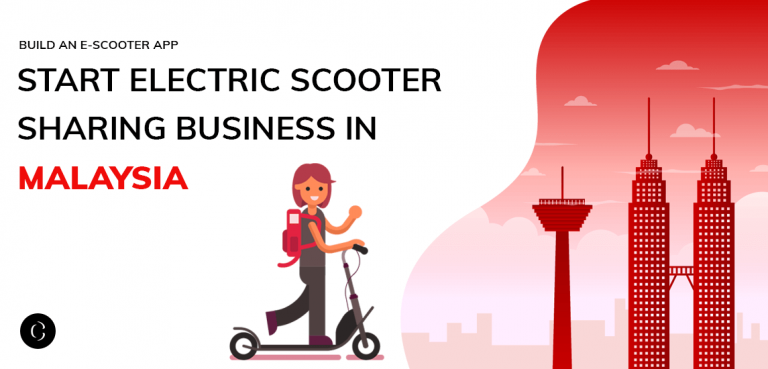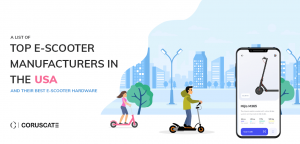Build an e-scooter app in Malaysia and start electric scooter sharing business in Kuala Lumpur, Malaysia – the most underrated micro-mobility market

The easiest way to taste the success in electric scooter sharing business is choosing city suffering from traffic congestion as the business terrain. Because people of that congested city have more reasons to rent your e-scooter than the available e-scooters in your fleet!
ASEAN cities including Kuala Lumpur are notorious for their traffic. According to a report published by Asian Development Bank, cities of the Philippines, Malaysia and Myanmar are among congested cities. The report also stated that congestion is costing governments millions of dollars every day. Congestion is also affecting the quality of the air.
Since governments also believe the same, they are encouraging people to opt more for micro-mobility vehicles which are faster, safer and eco-friendly. In the last few months, many Malaysian micro-mobility startups have raised a decent amount of money and expanded their business boundaries. However, the Malaysian micro-mobility market isn’t as challenging as other micro-mobility markets. It is, in fact, more challenging!
(Top players of) Malaysian micro-mobility market – IT HAS EVOLVED FROM THE ASHES!
Before the outbreak of the e-scooter apps and e-scooters, the trend of the bicycle rental took many global markets including Southeast Asian market by storm. Ofo and oBike were the two major bicycle-sharing companies ruling the market. And Malaysia was their major profitable market. By mid-2017, those both companies created a strong user base in Malaysia. In fact, Ofo tied up with unicorns Didi and Alibaba. But soon, Ofo broke its alliance with Didi and Alibaba, ran out of money, and stopped offering its services in Malaysia. Same happened with oBike. After the miserable performance of Ofo and oBike, none of the micro-mobility startups showed interest to start a micro-mobility business in any of the Malaysian cities.
Meanwhile, the size of the global e-scooter sharing market increased massively and micro-mobility startups finally put Malaysia on their radar. The Singapore-based Neuron Mobility and Beam became the early birds to enter the Malaysian micro-mobility market. And it was their safe bet! Within a few months, they attracted many users.
» Neuron Mobility:
Neuron Mobility is the Singapore-based micro-mobility startup founded by Zachary Wang in Jun 2016. In the last few months, Neuron Mobility experienced great success. It has expanded to cities in Malaysia, Thailand, Australia and New Zealand. It even has raised an $18.5 million in a financial round from GSR Ventures and Square Peg.
» Beam:
Beam – another Singapore-based micro-mobility company – was founded by Alan Jiang and Deb Gangopadhyay in July 2018. Since its one of the founders, Alan, has previous experience of working in a micro-mobility company, Beam has been witnessing skyrocketing growth. Within just 2 months of the inception, Beam has raised $6.4 million in its seed funding round which was led by Sequoia India, Founder Fund, and Class 5 Global.
Looking at the success of the Beam and Neuron Mobility in the Malaysian market, two local entrepreneurs Timothy Wong and Shazwan Abdul Razak launched an e-scooter app named TRYKE.
» TRYKE:
TRYKE was developed to hit the market in the fastest and cheapest way and they actually did it. Low app development cost allows them to offer e-scooter sharing service at the lowest price, compared to its other two competitors. TRYKE only charges RM1 to unlock the bike, plus RM0.30 per minute of usage, whereas Beam charges RM 1.50 to unlock and RM 0.45 for every minute of riding. TRYKE also offers daily, weekly and monthly passes for RM20, RM45, and RM150 respectively.
Like TRYKE, Beam and Neuron Mobility, if you are planning to build an e-scooter app in Malaysia, you should go for it as Malaysia is one of the most potential markets for micro-mobility startups. However, there are two major challenges which every micro-mobility startup has to overcome in order to be profitable in the Malaysian market.
Top challenges associated with Malaysian micro-mobility market
Things you should know to start E scooter sharing business in Malaysia
Following are the two major challenges associated with the Malaysian micro-mobility market which you have to know before developing an e-scooter app for Malaysia.
» Vandalism
Vandalism is the challenge almost all micro-mobility startups are facing. People wittingly damaging the e-scooter hardware makes micro-mobility startups suffer big financial loss. Especially, it puts already acquired permit at risk. So, it becomes very essential for micro-mobility startups to stop such kind of disturbances.
Luckily, there are several ways to stop vandalism. One of those is ‘security deposit’. When a user signs up, asks his credit or debit card details. And once he gives the details, the payment module checks the amount he holds in his bank account. If the amount he holds in his bank account is less than a threshold, do not allow him to unlock the e-scooter. In contrast, if he holds enough amount in his bank account, allows him to unlock the e-scooter. but if he damages the e-scooter, deducts a certain amount as the damage charge from his account. (We can develop such kind of legal app module.)
Proper use of a motion sensor is another way to protect the e-scooter hardware. All e-scooters of the Bird are equipped with a sensor which detects the motion of the e-scooter and if someone tries to moves it when it is locked, the alarm starts beeping loudly.
» Parking
Regulations related to the e-scooter parking are very harsh in almost all cities. Governments never want anyone to park e-scooter inappropriately. In fact, the operator is required to relocate the e-scooter if it is parked improperly.
You can solve this challenge by working with the local shopkeepers. You can build dedicated parking spots near their premises without paying anything. The reason why they should allow you to build an e-scooter parking spot outside their shops is purely for the sake of more business. Beam is using the same strategy.
‘Government regulations’ is also a challenge for many micro-mobility startups. Many micro-mobility startups fail to obey the rules and trap into legal battle which sometimes costs the permit.
So, now let’s discuss the e-scooter regulations in Malaysia which you have to keep in mind while developing the e-scooter app in Malaysia.
E-scooter sharing business regulations in Malaysia
Kuala Lumpur is a major Malaysian market for e-scooter startups. From May 2019, Kuala Lumpur City Hall (DBKL) made it mandatory for micro-mobility startups to acquire the proper permit before starting electric scooter sharing business in the city. DBKL also warned startups that they will seize the e-scooters of those startups which don’t have a valid permit.
The regulations mainly revolve around the suitable area to park e-scooters, permitted routes, operational aspects and safety of the users. DBKL executive director said that they do not want it to be like oBike!
Following are the most common e-scooter regulations in Malaysia.
- It is against the law to ride e-scooter without a helmet.
- The operator should provide helmets to riders.
- One should not carry pet and another person on an e-scooter.
- The operator should have valid insurance.
- Users are only allowed to ride e-scooters on footpaths and dedicated bike lanes.
- The operator should share sensor data and user data with the government for study upon being asked.
- The operator should operate the 24-hour toll-free number.
- Contact details of the operator should be printed on all hardware.
- If an e-scooter is non-functional, the operator should retrieve it as soon as possible.
- The operator should educate riders to ride e-scooters safe and park them properly.
Looking for a legal advisor as well as a technology partner to get the permit and build an e-scooter app in Malaysia? Well, your hunting ends here!
Coruscate is the top e-scooter app development company which has developed 10 e-scooter apps including an app named Legatus for Kuala Lumpur. We accommodate 100+ app developers, designers, IoT engineers, business experts, and legal advisors who all work together to help you deploy your app in the market at the surprisingly fast pace.
Our business experts and legal advisors help you to draft business plan, get a permit and decide on the business model. Whereas our app developers, designers, and IoT engineers actualize a disruptive e-scooter app which satisfies all your financial goals in the best possible ways.
Considering the different requirements of the different startups, we offer 3 approaches to develop the e-scooter app.
- We can develop a custom e-scooter app with all custom features which costs somewhere between $15000 to $25000.
- The price to develop the clone app of some popular e-scooter apps such as Bird and Lime starts from $10000.
- And the subscription plan of the white label e-scooter app solution starts from just $500.
Are you still confused? Contact us, talk to our business expert and solve every query you have. You will be rewarded with free e-scooter app demo and free consultation.









